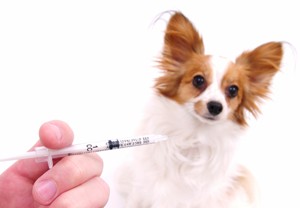I’m spending the evening staring at my dog. My little Maltese, Moose, was given a distemper vaccine today, and he had an allergic reaction. So far, it seems relatively mild – itching and scratching, swollen eyes. But, I’m in vigilance mode watching for any slight change that could suggest it might get worse.
After doing weeks of research, reading guidelines, weighing risks, I finally took the plunge and took him for his vaccine shot, long after it was “due”. As recommended by several veterinary organizations and veterinary thought leaders on vaccines, I opted to do his distemper shot without the parvo, avoiding the known pitfalls of overwhelming my small dog’s immune system with too many immune stimulants. Despite that, he has had a reaction, seemingly allergic, to the vaccine. Within minutes of leaving the vet he was scratching, and the scratching got worse as we made our way home. I immediately called the vet who recommended Benadryl and vigilance. I shaved off a seemingly microscopic piece of a Benadryl tablet (one mg per pound of body weight), wrapped it in some cheese and gave it to him. I then gave him a bath with a soothing shampoo and trimmed away his long hair to help cool his skin. It seems to have helped. The itching has stopped and he’s resting. His eyes seem less swollen. While my vigilance continues, my anxiety is beginning to wane. I think he’ll be ok. I think were lucky.
Not every dog or cat owner is lucky. While the vast majority of vaccines administered to dogs and cats in this country cause no side effects at all, They do occur, and some reactions can be severe or possibly deadly if not treated quickly. While I’m a big believer in the benefits of vaccines – for pets and people – they aren’t without risks. And while the risk/benefit ratio is almost always weighted on the side of the benefit column, the risks are worth considering and are all too often downplayed in some veterinary forums. But unless we understand the potential risks, examine and learn from the adverse events that happen each year, we’ll never be able to make informed choices based on the specific needs and unique traits and health histories of our pets.
Beginning with Bias, then …
I have to admit, prior to bringing home such a small dog, I didn’t give much thought to the risks of vaccines. I’ve always vaccinated my dogs, trusting the vet to decide what was best. I never really bothered researching the risks. Occasionally, I would see references to “research” about vaccines that suggested links to autoimmune disease or cancer or some other awful outcome. But, to be honest, I didn’t take them very seriously. In most cases, the “research’ turned out to be opinion articles written by purveyors of “natural remedies” or wholistic alternatives. The articles provided anecdotal “evidence” of the harm of vaccines and the healing powers of natural medicine, but very little science-based research.
My experience with the purported benefits of “natural” remedies for human diseases, such as diabetes, has taught me to be skeptical. While I take vitamins, have often seen a chiropractor and strongly believe in the benefits of acupuncture, yoga and meditation, I’ve seen very few peer-reviewed scientific studies that show any benefit from herbal remedies for treating diseases. I continue to have an open mind. And, I have several friends who take their dogs to “wholistic” vets who seem to do an excellent job of combining mainstream veterinary medicine with non-traditional veterinary remedies. But after living with difficult to control type 1 diabetes for 27 years, I’ve been offered a full range of unsolicited advice by people who espouse the miraculous benefits of everything from cinnamon to raw food and creatinine supplements as a “cure” for diabetes. (To date, I’ve resisted the urge to strangle the person proffering this “wisdom”, but I make no promises about the future.)
In my professional life in the health care world, I’ve also seen the real damage that fear of vaccines for children have caused. A small study published in the Lancet in 1998 based on flawed methodology showed a possible connection between the Measles, Mumps and Rubella (MMR) vaccine and autism. Despite much skepticism from the scientific world, frightened parents stopped vaccinating their children against potentially deadly diseases, leading to a series of outbreaks of diseases that once were almost fully eradicated. Twelve years later, an investigator surfaced proof that the original study author had faked the evidence. In the intervening years, the fraudulent researcher had made a lot of money, provided a false enemy to heartbroken parents of autistic children and many children had died or become disabled due to outbreaks of once controlled diseases.
Rethinking Pet Vaccines
This was the backdrop that shaped my bias as I began to look into the vaccine issue. But it didn’t take much reading before I began to realize there was more to the story than I had originally thought. I thought that the vaccine issue would be relatively straightforward: do the research, based on the research weigh the risks/benefits for Moose and Buckley, choose the course of therapy appropriate for my dogs, then write a couple of blog entries about the process.
It’s not that simple. I’m still not sure what to think. There’s a lot about vaccines for our pets that we still need to learn and explore, and I could spend the next 10 years researching the issue and possibly not be any more sure than I am now. At the same time, severe side effects from vaccines, such as death, are extremely rare, and the diseases against which they protect our pets are often deadly. At some point, you have to make an informed decision based on imperfect evidence.
I found the clinical guidelines published by the AAHA and followed them. Because our dogs are small, our vet gave monovalent shots. Buckley completed his shots with no issues. Moose had his first shot for distemper today and had an allergic reaction. Fortunately, it looks like Moose will be fine.
Did my vet and I make a mistake? Maybe, but not necessarily. Moose had been given the same basic formulation from the same manufacturer during his puppy series and did not have an issue. There was no reason to think he would have an adverse event. I could have pressed for a pre-vaccine blood test where they look for the level of circulating antibodies within the blood stream to determine if the dog’s immune system will still have immunity to that pathogen (commonly called a titer test). I had already delayed his vaccine a full year beyond what is recommended. This time it didn’t seem necessary. Needless to say, next time, I’ll do the titer test. If he’s had one allergic reaction, he’s likely to have more. And his tiny, 2.8 pound body is a bit more fragile than most.
As for his eight-pound brother Buckley, I’ll probably do the blood tests for him, as well. He’s strong and very healthy. But why take the risk if he doesn’t need it? Why not test for retained immunity before subjecting my dogs to unnecessary challenges to their immune system. If the goal of vaccinations is to keep your pet healthy and free from disease, a simple blood test seems like an obvious way to decrease the risk of a bad reaction.
The science of vaccines is incredibly complex. I’m the kind of person who likes to read medical research abstracts, but the published literature in immunology and vaccines is very challenging for a non-expert. Despite the fact that type 1 diabetes is an autoimmune disease, there are no diabetes treatments that address the immunity issue to date, so I’ve spent very little time trying to understand the immune system in my life as a diabetes “e-patient”. Sorting through the science of pet vaccines has been time consuming, and I’ve just scratched the surface.
But, you have to start somewhere. In the accompanying posts, I’ve tried to summarize some of what I’ve learned and provide links to resources far better than anything I could write in hopes of helping others find the information they need to decide what’s best for their pets.



